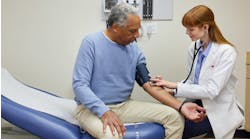“Welcome to your health family.”
Patients see that greeting every time they open North Memorial Health’s website. For us, however, it’s more than a greeting. The “health family” philosophy is something we’ve taken to heart and have woven into the fabric of our specialty pharmacy program. North Memorial Health may not be the largest health system in the Minneapolis area, but every day our pharmacy team creates a genuinely patient-centered experience for those needing specialty medications. This approach has proven beneficial not just for patients, but for the health system as a whole.
As more patients require costly specialty medications, all health systems should take a fresh look at the opportunities presented by in-house specialty pharmacy programs. Pharmacy is no longer just a cost center. Instead, pharmacy services offer new avenues for patient-centered care, provider support and revenue generation.
Taking a partnership approach
Specialty medications often are part of complex treatment regimens, and they frequently carry a significant expense. In fact, some statistics show 29 percent of total pharmacy benefit spending originates from the top five specialty medication classes. With so much on the line, health systems are uniquely positioned to improve the specialty medication experience for patients and providers alike by developing strong, clinic-based specialty pharmacy support services.
These were among the insights that led North Memorial Health to start offering specialty pharmacy services in our cancer center in 2009. At the time, a single staff member was hired to assist patients who required intravenous (IV) chemotherapy. Six years later, we added another support specialist to help patients who needed other specialty medications such as oral oncolytics. With the addition of these team members, we felt we could better advise patients and providers about specialty therapies, as well as help them navigate financial assistance and prior authorization processes.
A couple of years later, North Memorial Health also started to fill employees’ specialty prescriptions through its existing retail pharmacies. As a self-insured health system, the amount we spent on those medications was steadily rising. With 1.7 percent of prescriptions responsible for about 52 percent of our costs, it was important to control those expenditures in a way that would also satisfy our employees’ care needs.
Then, during a period of expansion in late 2017, North Memorial Health’s leadership looked even closer at specialty pharmacy services. How could we further enhance both the customer experience and revenue? Leadership recognized that it’s essential for every health system to gain greater ownership of complex patient populations — especially as they enter into more at-risk contracts with health plans.
However, leadership also understood that expanding an in-house specialty pharmacy program can pose substantial challenges, including effectively managing expenses, staffing and support. Another hurdle involves establishing partnerships with payors and pharmaceutical manufacturers in order to access a greater array of specialty drugs to meet patients’ needs. In addition, effective specialty pharmacy services require the infrastructure and expertise to drive therapy adherence — a different set of skills and competencies than in other areas of pharmacy practice. After a patient starts a specialty therapy, strong relationships and disciplined processes are needed to keep them engaged in a regimen that may have challenging financial and clinical side-effects but will be beneficial to their long-term health.
For these reasons and more, North Memorial Health evaluated several options for expanding the specialty pharmacy program. We took into consideration the upfront capital investment, advanced technology, and expertise needed to grow the program on our own. We also considered what might be achievable by engaging in various industry partnership models. Then, keeping in mind the health system’s overall growth plans and capital requirements, North Memorial Health opted for a true performance-based partnership with Trellis Rx, which empowers health systems to build, grow, and operate clinic-based specialty pharmacy programs.
Even before contract signing, Trellis Rx conducted a comprehensive assessment to outline North Memorial Health’s potential bottom-line opportunities. Trellis Rx’s business model aligned with North Memorial Health’s strategy because it intentionally takes on the operational and financial risk of growing the specialty pharmacy service. Together with Trellis Rx’s specialty pharmacy expertise and integrated technology platform, the partnership helps mitigate any growth obstacles North Memorial Health might have experienced on its own.
Just as important, though, was Trellis Rx’s commitment to the “health family” philosophy. Embedding pharmacists and liaisons to work on-site in our outpatient clinics was key to ensuring high-touch, patient-centered services.
Growing the clinic-based specialty pharmacy program
As with all programs at North Memorial Health, the specialty pharmacy program was patient-centric from the very beginning. North Memorial Health and Trellis Rx worked together to build on the health system’s initial success.
To activate the expanded program, the team quickly brought in experienced pharmacists and technicians to work on-site in our clinics under the health system’s brand. The team focused on building relationships and evaluating and revamping workflows. The goal was to ensure an excellent customer experience not just for patients, but for our providers as well. We made sure existing team members’ voices were heard, processes were smooth, and strong communication was in place.
That included integrating Trellis Rx’s advanced technology solution with our EHR to support proactive patient identification and management, as well as coordination with other care team members. By streamlining workflows, both patient and provider experiences have improved. Now, as soon as a provider prescribes a specialty medication, pharmacy liaisons begin the prior authorization process and help patients with financial assistance if needed. In fact, within the first six months of integrating the program, staff helped secure over $500,000 in financial assistance for patients needing specialty medications.
The expanded clinic-based program launched in the cancer center within six weeks of contract signing. A second clinic program (infectious disease) launched two weeks later. All combined, the team expanded the clinic-based specialty pharmacy model to provide high-touch, personalized care to three additional clinics in seven months. Moreover, as a result of the program’s impact, Blue Cross and Blue Shield of Minnesota recently has agreed to include our specialty pharmacy in its specialty pharmacy network.
Seeing the benefits
Today, specialty pharmacy team members work with providers and patients — sometimes even before a prescription is written — to identify and overcome barriers to access and adherence. This includes financial assistance, face-to-face education and ongoing support. The specialty pharmacy acts as a one-stop-shop for helping providers and patients more effectively manage specialty medications.
When patients need alternative medications due to authorization denials, for example, clinical pharmacists work with the physician and patient to identify the most appropriate choices. As a result of this proactive approach and the advanced technology in place, patients receive their medications faster. The “script-to-mouth” time has been reduced from two weeks to just under two days.
In addition, pharmacy staff follow up with patients to make sure they’re taking their medications. These face-to-face and phone conversations help patients effectively manage potential medication side effects rather than discontinue treatment. Staff also identify when a therapy isn't working as expected, and coordinate with the physician to switch patients to another medication. This helps reduce the amount of time and money spent on ineffective drug therapies.
This high touch “health family” approach is particularly effective in helping make sure patients adhere to their treatment plans, yet the benefits extend beyond patients and providers. Through its patient-centered program, North Memorial Health also has increased its specialty pharmacy revenue by nearly 80 percent in just six months. This incremental financial benefit will help us further fund additional clinical services across our system.
Considerations for other organizations
In a competitive market, North Memorial Health’s high-touch customer experience is a key differentiator. Achieving it requires partnerships and alignment at all levels — between patients, providers, support staff and more. For health systems that want to follow suit, here are two important lessons we’ve learned on our journey building a comprehensive, patient-centered specialty pharmacy program:
- Recognize that a health system-centric special pharmacy approach is here to stay. Specialty medications comprise a significant and growing part of pharmacy effort. One study, for instance, shows that 32 of the 42 new active substances introduced in 2017 were specialty medications. While cost control is a major focus of drug management in the inpatient setting, health systems should focus more on growth as an outcome in outpatient/infusion settings. This is where tremendous opportunity exists to improve outcomes, satisfaction and revenue.
- Evaluate existing risk-based contracts closely. Then, seek out a specialty pharmacy partner that’s aligned with your organization’s needs and goals. For health systems at risk, for example, owning and controlling as much of the patient experience as possible is essential. In such situations, partnerships that help build and execute access strategies can prove beneficial results, such as our recent partnership with Blue Cross and Blue Shield of Minnesota. Likewise, organizations that lack required resources and specialty pharmacy expertise — or those that want to mitigate upfront risk or drive speed to market — might benefit from a performance-based partnership.
Strategic opportunity, transformational results Health systems are in a unique position to improve the specialty medication experience for patients and providers. Improving outcomes requires commitment and partnership from every part of the healthcare continuum. With the right expertise and support, however, we can help patients access specialty medications and comply with their best possible treatment plan. For health systems ready to think and act strategically, a high-touch specialty pharmacy model can significantly strengthen both revenue and the curative power of our collective “health family.”
Paul Krogh is System Director of Pharmacy Services at North Memorial Health, and Denali Cahoon is Chief Operating Officer at Trellis Rx, a specialty pharmacy partner helping health systems like North Memorial Health fund, build, and grow their specialty pharmacy programs.

